Inasmuch as there is a massive operation taking place in the USA that has so far produced 10,000 sealed indictments, it is reasonable that Trump's visit with the King provided much needed intelligence and been Saudi Arabia, the fallout is typically more direct. something huge and historic is happening and the actual storm will be well over before anyone really knows anything.
The storm is very much happening under a cloud of total secrecy..
What has clearly happened in Saudi Arabia, is that Princes meddle and this has just blown up in their faces and they are all buying themselves out of sudden death. It also appears radical Islam is now on the agenda as an enemy of the Saudis as well.
Again no one is actually talking, but the foot prints are Trumps and they are global..
.
Recent Arrests Clear Way for Reform of Saudi Arabia and Its US Ties
Arrested princes tied to subversive movements, terrorist support, and finances for US politicians
December 14, 2017 12:32 pm
Last Updated: December 14, 2017 11:18 pm
https://www.theepochtimes.com/recent-arrests-clear-way-for-reform-of-saudi-arabia-and-its-us-ties-2_2384905.html?
Saudi Crown Prince Mohammed bin Salman in
Riyadh, Saudi Arabia, on April 11, 2017. (Bandar Algaloud/Courtesy of
Saudi Royal Court/Handout/File Photo via REUTERS)
A major shift in power took place early last month in Saudi Arabia,
when 11 princes and 38 other top figures in the kingdom, including
ministers, military officers, and influential businessmen, were arrested
in a corruption probe. The crackdown will test whether the desert
kingdom can bring about a peaceful transfer of power, and cast off a
radical ideology that has influenced its relations with the United
States.
A new anti-corruption committee led by Crown Prince Mohammed bin Salman carried out the arrests beginning on Nov. 4, with more than 500
eventually rounded up. The targeted top officials and members of the
royal family are reputed to be fabulously wealthy, with superyachts,
jets, and hundreds of cars, and were previously believed to be above the
law.
The government-friendly press in Saudi Arabia reported on the arrests as a sign that the crown prince was serious about an ambitious reform agenda.
The government itself said the arrests were part of an effort to increase transparency, accountability, and good governance, to curtail corruption, and to take back embezzled funds.
Not mentioned publicly by the government is what critics say is the most powerful reason for the crackdown: the desire to remove any challenges
to the crown prince’s rule, before he formally ascends to the throne.
Among the challenges facing the reformist crown prince are radical
interpretations of Islam that have been used to justify terrorism around
the world and strict enforcement of Islamic law at home.
At the center of the drama is billionaire Saudi Prince Alwaleed bin Talal, the 50th richest
person in the world. Alwaleed resented being passed over when King
Abdullah announced his successor.
Alwaleed’s father worked to bring
radical interpretations of Islam to Saudi Arabia, and Alwaleed himself
has imported radical Islamist teachings into the United States, as did
others who were swept up in the early November raids.
-
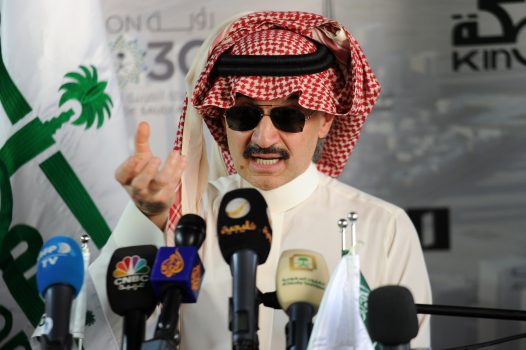
The recently-arrested Saudi Prince Alwaleed bin Talal speaks during a May 11 press conference in the Red Sea city of Jeddah. (Amer Hilabi/AFP/Getty Images)
Ambition Denied
In 2009, Alwaleed thought he’d become king. Forbes reported
at the time that Alwaleed had been “making noises lately about
eventually becoming king,” and that Alwaleed had in his career made
contact with more than 209 prime ministers and heads of state. He had
fostered ties with then-President Barack Obama, as well as with the Bush family and the Clintons.
In March 2009, Alwaleed’s father, Talal bin Abdulaziz al-Saud, began publicly questioning Saudi Arabia’s King Abdullah about who would be his successor, after it became apparent his son was not the choice.
When King Abdullah announced in October 2011 that Muhammad bin Nayef
al-Saud would be crown prince, rather than Alwaleed, Talal made his dissatisfaction known.
Talal withdrew from the Allegiance Council that determines succession to the throne and a month later declared,
according to Middle East research institute MEMRI, that the “hand of
justice” in the National Anti-Corruption Authority should reach
everyone, regardless of their social status. Soon after, in June 2012,
he began publicly questioning the legitimacy of the crown prince.
For those familiar with Talal’s history, this could very well have been taken as a direct threat.
‘The Red Prince’
Talal has a history of radical Islamist politics, and was previously suspected of attempting a coup in Saudi Arabia.
In the 1950s, the threat of communist takeover came to the doors of
Saudi Arabia under the banner of “modernization.” This followed trends
that had already taken shape in Egypt, where the Muslim Brotherhood was
spreading a new form of Islam that merged socialism with the Islamic
religion.
The new system originated with Sayyid Qutb, who was considered to be
the founding father of the Muslim Brotherhood, and whose books,
“Milestones” (1964) and “In the Shade of the Quran” (written 1951–1965),
helped create the model for the new Islamic regimes that would sweep
the Arab world.
“He evokes a lot of Islamic ideology to push for theocracy,” said Dr.
Zuhdi Jasser, president of the American Islamic Forum for Democracy, in
an earlier interview. Jasser said Qutb’s new socialist form of Islam,
which he described as “Islamism,” warped the concept of sharia (Islamic
law) to push the idea that religion should be enforced by the state.
Qutb also advocated “offensive jihad,” which could justify armed conquest on behalf of Islam. The Saudi Osama Bin Laden was mentored by a student of Qutb’s brother, and Qutb’s ideas helped inspire the terror group al-Qaeda.
According to the 2005 book “The Saudi Enigma: A History” by Pascal Ménoret, leftist Islamic scholar Ali al-Umaym described
the Muslim Brotherhood’s new brand of Islam as one that “concerns
itself with communism, socialism, nationalism, liberalism, and all the
currents from the West.”
In Saudi Arabia in the 1950s, communist and socialist movements were
calling for these “Egyptian reforms” to replace the conservative
monarchy. Among these groups were the Central Committee of Arabian
Workers, the Organization of Saudi Communists, and the National Renewal
Front, which later became the National Liberation Front in 1958—a
precursor to the Communist Party of Saudi Arabia.
The revolutions eventually reached the royal family. A group of
princes formed the “Free Princes” movement to demand reforms and
directly challenge the king. Leading this movement was Alwaleed’s
father, Talal, who was then known as “The Red Prince.”
King Saud, who ruled until 1964, declared that the Free Princes
movement was a form of veiled communism, according to Ménoret, and he
took actions to quell the unrest, which included the creation of the
King Saud University based on the Muslim Brotherhood’s new brand of
Islam.
Yet, for the communists, this was not enough. In 1962, a Saudi air
force pilot fled to Egypt and revealed that a communist organization
within the Saudi military was planning a coup. Around this time, Saudi
authorities searched the palaces of Talal, who criticized the Saudi
royalty and temporarily went into exile in Egypt.
In 1969, a military coup was prevented and, according to Ménoret,
“hundreds of officers, workers and civil servants were arrested.” Over
the next year, three more attempted coups would be uncovered.
As Talal began to back away from his attempted revolution, however,
his son Alwaleed would carry forward his father’s support for communist
movements, the Muslim Brotherhood, and a push for power.
Growing Influence
Alwaleed brought his father’s politics to a new arena: the United States.
During a 2008 interview on the NY1 TV station talk show “Inside City
Hall,” pro-communist and former Manhattan Borough President Percy Sutton
said he had been introduced to a young Barack Obama when the future U.S. president was applying to Harvard Law School in the late 1980s.
Sutton said he was introduced
to Obama “by a friend who was raising money for him,” and he identified
this friend as Dr. Khalid al-Mansour, whom he described as “a principal
adviser to one of the world’s richest men.” Al-Mansour asked Sutton to
write a letter to his friends at Harvard to support Obama’s entry.
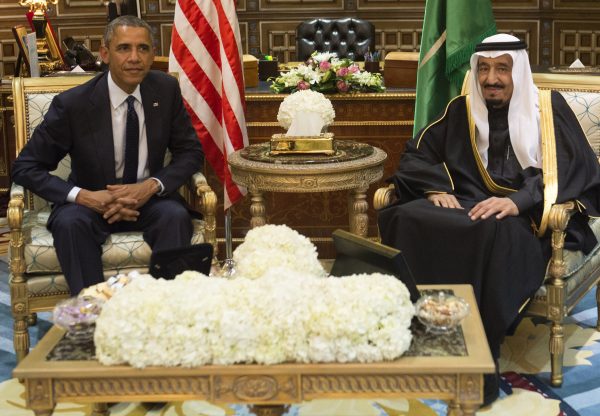
The individual Sutton described as “one of the world’s richest men”
was Alwaleed, and his principal adviser, al-Mansour, was helping to
finance the education of select individuals who they believed could
become assets in the future.
According to Trevor Loudon, author of “The Enemies Within,”
Alwaleed’s choice of principal adviser was significant. Al-Mansour,
formerly known as Donald Warden, was a mentor of Huey Newton, the
founder of the Black Panther Party, which advocated for Maoist guerrilla
warfare.
Obama’s campaign initially denied Sutton’s recollection, but news
outlets found a 1979 column by Chicago Tribune columnist Vernon Jarrett
titled “Will Arabs Back Ties to Blacks With Cash?” that further detailed
al-Mansour’s agenda.
Investor’s Business Daily reported in September 2012 that Jarrett’s
column detailed how al-Mansour was working on a program to secure $20
million a year, for 10 years, to finance minority students. It states, “These minority students would then migrate through the political system, promoting Palestinian and radical Islamist causes.”
Alwaleed was also financing Islamic study programs with ties to the
Muslim Brotherhood and terrorist organizations at universities around
the world.
In December 2005, Alwaleed gave $20 million to Georgetown
University’s Center for Muslim–Christian Understanding. The move was
considered especially controversial because of the center’s director,
John Esposito, whom FrontPage Magazine described in 2008 as being “known for his vigorous apologetics for Islamic extremism.”
Around the same time, Alwaleed gave another $20 million to fund a similar program at Harvard University. Suzanne Gershowitz of the American Enterprise Institute wrote in National Review
that the program tends “to amplify anti-American rhetoric, legitimize
conspiracy theories, and, in the name of cultural relativism, gloss over
the oppression that exists in the Arab world.”
US Connections
The Saudi connections go beyond support for Obama and influence at
American universities, however, and extend to other Saudi officials
swept up in the recent arrests.
Saudi Arabia is among the largest donors to the Clintons, and according to Fox News,
by 2008 the Kingdom of Saudi Arabia had given between $10 million to
$25 million to the Clinton Foundation. According to The Washington Post,
the Saudis also gave close to $10 million to Bill Clinton’s presidential library.
Soon after the terrorist attacks on Sept. 11, 2001, it was revealed that 15 of the 19
hijackers were Saudi nationals. The recently declassified sections of
the 9/11 Joint Congressional Inquiry’s report also revealed that the
hijackers had ties to key members of the Saudi government.
According to Harper’s Magazine,
a July 2, 2002, memo said there was “incontrovertible evidence that
there is support for these terrorists within the Saudi government.”
John Lehman, President Ronald Reagan’s Navy secretary and a member of
the 9/11 Commission, also explained the known Saudi ties to terrorism,
according to “The Commission: The Uncensored History of the 9/11
Investigation” by Philip Shenon.
“Lehman said it was well-known in the intelligence circles that the
Islamic affairs office functioned as the Saudis’ ‘fifth column’ in
support of Muslim extremists,” Shenon states.
Other documents revealed, according to New York Post, that the Saudi Embassy paid for two Saudi nationals to fly from Phoenix to Washington for a “dry run for the 9/11 attacks.”
Former President George W. Bush was pressured to launch an inquiry
into the attacks, and initially nominated Henry Kissinger to head the
investigative commission.
-
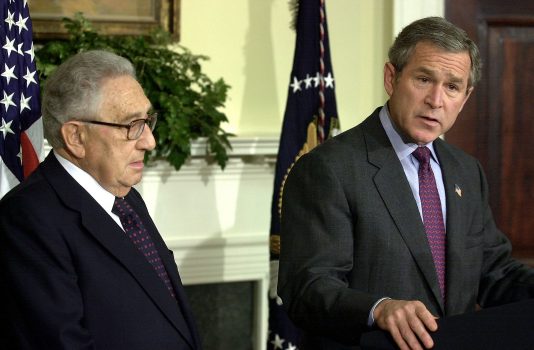
Former President George W. Bush speaks alongside Henry Kissinger prior to signing a bill to create an independent commission to investigate the attacks on the World Trade Center and the Pentagon, and the years leading up to them, in the Roosevelt Room at the White House in 2002. (Ron Sachs-Pool/Getty Images)
Kissinger was soon revealed, however, to have defended Saudi Arabia
from accusations that it was tied to terrorism, and may have himself had
financial ties to Saudi Arabia.
Just 16 days after Kissinger was appointed, in December 2002, he
resigned from his position as head of the 9/11 panel, allegedly because
the position would force him to liquidate his Kissinger Associates Inc.,
but also under accusations of conflicts of interest.
In “The Commission,” Shenon detailed what took place behind the
scenes in the 9/11 Commission, and noted that during a meeting in 2002,
when Kissinger was asked if any of his clients were named bin Laden, he
spilled his coffee and “seemed to lose his balance from the sofa at the
same moment, nearly falling to the floor.”
The bin Laden family, of which former al-Qaeda leader Osama bin Laden
was a part, is highly influential in Saudi Arabia. Bakr bin Laden,
chairman of the Saudi Binladin Group and brother of Osama bin Laden, was
among those recently arrested alongside Alwaleed.
The Bush family also had ties to the bin Ladens through George W.
Bush’s Arbusto Energy, which received a $50,000 investment from aircraft
broker James Bath. According to The Wall Street Journal in 1999, Bath
was appointed as the Houston representative to Salem bin Laden, Osama bin Laden’s half-brother, in 1976.
Salem bin Laden and Osama bin Laden had met several times in 1986 in London to negotiate the purchase
of Russian-made surface-to-air missiles, according to The Washington
Post in 2008, which cited “The Bin Ladens” by Steve Coll. This was at a
time when Osama bin Laden was fighting for the Mujahideen against the
Soviet Union.
The Bush family also had close ties to Saudi Prince Bandar bin Sultan
al-Saud, a former ambassador to the United States and the former head
of Saudi Arabia’s main intelligence agency.
Bandar is allegedly one of the princes being investigated in the recent crackdown.
In July 2016, a 28-page section of the 9/11 report that had been withheld from the public was declassified. It revealed that Bandar had
ties with the 9/11 hijackers. This included his relations with Osama
Bassnan, a suspected Saudi intelligence agent, who cashed a $15,000
check from bin Sultan.
-
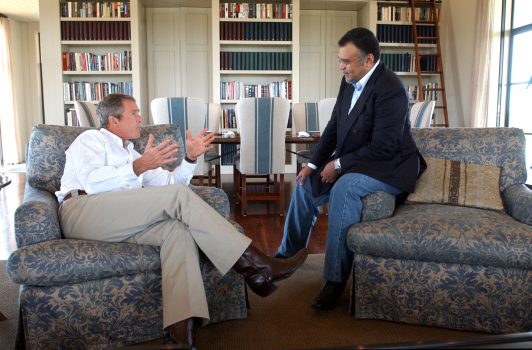
Former president George W. Bush meets with Prince Bandar bin Sultan, the Saudi Arabian ambassador, at Bush’s Ranch in Crawford, Texas, in 2002. (Eric Drapper-White House/Getty Images)
Bandar had also been in contact with at least two of the 9/11
hijackers, and with terrorist supporter Omar al-Bayoumi, who allegedly
provided assistance to the hijackers and received monthly payments from a
company the FBI believed had ties to Osama bin Laden and al-Qaeda.
Bandar also frequently went hunting and fishing with George Bush Sr., and according to the 2008 book “State of Denial: Bush at War”
by Bob Woodward, Bush Sr. encouraged George W. Bush to consult with
Bandar on foreign affairs. The younger Bush allegedly stated, “My dad
told me, before I make up my mind, go and talk to Bandar,” and that
Bandar “knows everyone around the world who counts,” and “maybe he can
set up meetings for you with people around the world.”
Shortly after the 9/11 terrorist attacks, Bush met privately with
Bandar, on Sept. 13, 2001. The content of their discussion is still
largely unknown. According to The Guardian in 2004, Bush was already
alerted of the Saudi involvement in the attacks, yet, on the same
afternoon as his private meeting with Bandar, he allowed 11 chartered planes to fly more than 140 Saudis out of the country—many of whom were not interviewed by the FBI.
Just days after the terrorist attacks, on Sept. 18, 2001, Alwaleed
offered $10 million to New York City for relief. Former New York City
Mayor Rudy Giuliani rejected Alwaleed’s donation, however, after Alwaleed suggested the attack was tied to U.S. policies on the Middle East.
Alwaleed was later a key supporter of Imam Feisal Abdul Rauf, the
cleric who aimed to build a 15-story mosque two blocks from Ground Zero.
In September 2016, Obama vetoed a bill that would allow family
members of 9/11 victims to sue Saudi Arabia, arguing such a law would
expose U.S. officials to being sued in foreign countries. Congress
promptly overrode his veto.
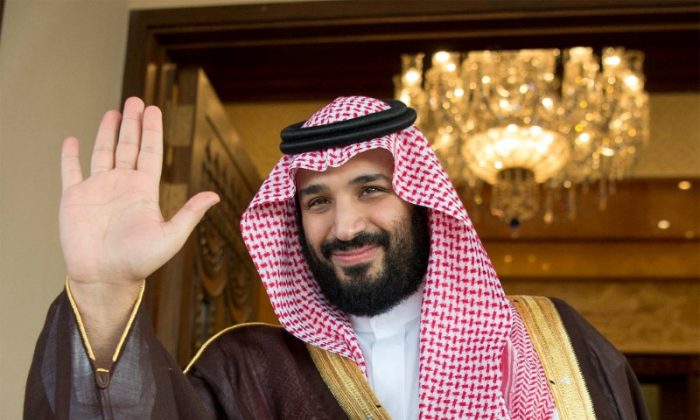
No comments:
Post a Comment